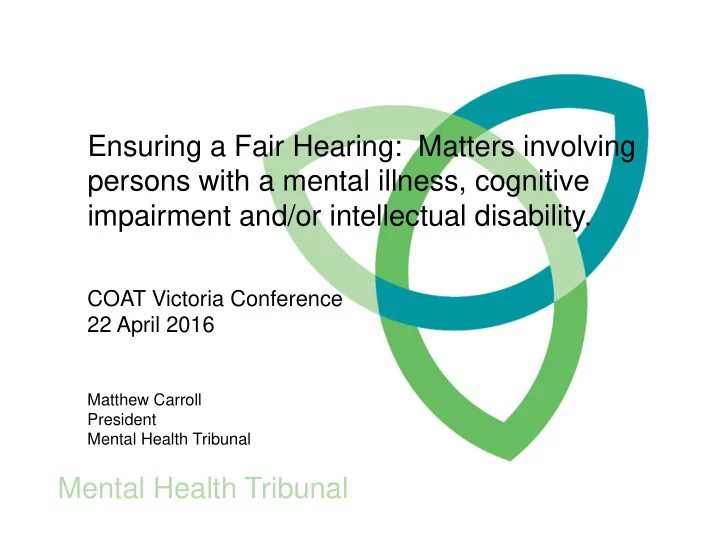

Ensuring a Fair Hearing: Matters involving persons with a mental illness, cognitive impairment and/or intellectual disability. COAT Victoria Conference 22 April 2016 Matthew Carroll President Mental Health Tribunal Mental Health Tribunal
Functions of the MHT The MHT makes orders for / approves: • compulsory treatment for severe mental illness; • ECT for compulsory patients without capacity to consent and young people under 18; • neurosurgery for mental illness. The MHT also has a review jurisdiction in relation to security patients – prisoners transferred to hospital for compulsory treatment.
Three Procedural Fairness Challenges in MHT Hearings 1. Exploration of the case for compulsory treatment. 2. Restricted adjournment power. 3. Urgent applications relating to electroconvulsive treatment (ECT).
1. Exploring the Case for Compulsory Treatment A number of procedural fairness challenges can arise: • References to broad clusters of symptoms but few specific details relating to the individual patient. alternatively • Such detailed and negative recitation of acute symptoms and associated events a person’s sense of hope and dignity can be compromised. • Reports rendered impenetrable by acronyms and medical jargon. 4
2. Restricted Adjournment Power The former MHRB’s adjournments were counted in the thousands arguably rendering the scheme of the MH Act 1986 almost illusory: • 2012/13 – 2875 • 2013/14 – 2207 The solution in the MH Act 2014 is strict hearing timelines and limited powers to adjourn a matter (once, for up to two weeks, and only in exceptional circumstances): • Hearings adjourned in 2014/15: 434. On balance the legislative solution is sound. However in a small number of matters a hearing must proceed even when a short delay would otherwise be appropriate.
3. Urgent ECT Applications Any application for an ECT Order must be finalised within five business days (meaning even ‘standard’ hearings involve procedural fairness challenges). In addition a psychiatrist can request an urgent hearing, which then means the application must be heard as soon as practicable. Grounds of urgency are: • To save the person’s life; or • Prevent serious damage to the health of the person; or • To prevent the patient from suffering or continuing to suffer significant pain or distress. In 2014/15 49% of applications included a request for an urgent hearing, as at 31 December 2015 this had risen to 63%. Currently 52% of ECT applications are heard within 1 day, rising to 73% in 2 days. As a consequence little if any notice of hearing or opportunity to access advocacy, legal representation or other supports.
Recommend
More recommend